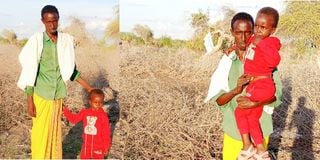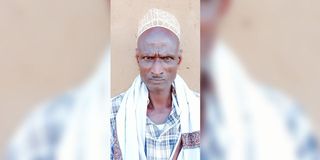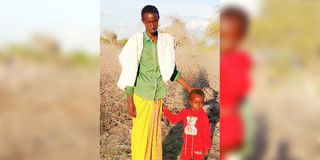New life for boy, 4, who miraculously survived six days alone in Tsavo park

Reunion: Ayub Ahmed, 4, with his father Abdi Salat in Gerasa Village, Tana River County. He was rescued after wandering in the Tsavo wilderness for almost a week.
In Gerasa village in Tana Delta Sub County in Tana River, the atmosphere is still filled with joy and tales of four-year-old Ayub Ahmed, a local celebrity.
The mind-boggling question is how he managed to survive six days in the wilderness of Tsavo National Park, an area even adults cannot survive without weapons.
Even for big wild animals, it’s always a ping-pong game with marauding predators.
But young Ayub made it alive after six days surviving on rain water and amarula seeds-like pods.

Ayub's father Abdi Salat says the boy was found carrying one of these amarula seeds-like pods.
In this sleepy village, the little boy's story is more a tale of bravery than that of a missing child; a story of a warrior and a leader in the making, “ordained by God and the ancestors”.
It all started on the morning of Tuesday, November 29, 2022. It was a day like any other for young Ayub in the remote village of Tana River County.
As usual, Ayub joined his friends to play, games that would extend to neighbouring homes and end at the cattle drinking troughs in Asa.
"He loves goats, he is ever there when herders arrive to water their livestock, and he has always enjoyed helping out, especially picking sticks to guide kids to drink away from the goats lest they get hurt. He plays a lot and never misses an encounter with the herders every time they come to water their animals, he is always a cheerful helper," said Abdi Salat, his father.
However, on this day, he was seen organising the kids and cuddling with another that appeared to be injured.
They were more than 60 kids, he pushed them aside to protect the injured one and made sure it quenched its thirst, and shortly after, he was out of sight.
Did not pay much attention
Unbeknownst to the herders, he had moved ahead with the kids to protect the injured one, hence they did not pay much attention as they led hundreds of cattle into the Tsavo National Park.
"They never graze too far in the forest because it is dangerous. Nobody from this village has ever gone beyond 10 kilometres and come back alive. The furthest has always been about seven kilometres," Mr Salat offered.
Ayub is always home for lunch at noon; his programme is always timely and his mother is always ready with his food when he gets back. But on that day, he did not show up.
"I assumed he decided to eat at his friend's home, but deep inside I was curious, though I decided to give it a benefit of the doubt," said Bocha Ramadhan, his mother.
Her heart however became disturbed after he saw the friends her child plays with were playing without him.
Upon inquiry, they told her that he was playing with goats at the local well when they parted ways.
She decided to alert Ayub’s father who decided to look around the village.
By the time the herders were returning in the evening, young Ayub was not among them, and could not be found anywhere in the village.
"One of the herders saw him head out with kids and told us the group he was part of, but the group denied taking him with them, so we decided to inform the area chief," said Ms Ramadhan.
Local chief Razga Roba called the search expert, Abdalla Bonea, known in the village as "Gugul", derived from America’s search engine name, Google, due to his skill in tracing lost people for the past 40 years.

Abdallah Bonea alias "Gugul", a traditional search expert from Gerasa Village in Tana River County.
"He is the only person who can read the footprints of a lost person, livestock, or even wild animals that attack livestock in the village. He is tasked with organising and leading the search," said Mr Roba, the local chief.
As is the norm, each household fronted one person to join the search party, a mandatory directive for the families during such times.
Failure to front someone would lead to ex-communication of the family across the village, hence none dared to run away from the call.
Following the footprints
On that day, 100 men gathered to begin the search that would go into the night, Mr Bonea leading from the front, following the footprints of the child among those of the livestock.
However, after seven kilometres into the national park, the heavens opened up, thwarting the search efforts. Then something tragic happened: The footprints got washed off.
"We had to come back, the effort was not going to bear much fruit since there was nothing we could rely on, so we came back to restrategise on how to execute the search the following day," said Mr Bonea.
On the second and third days, the search team made it barely three kilometres from the village as the rains kept pounding, forcing some men to drop from the team and send replacements from their families.
Realising that they were not going to be successful with the search, the villagers sought the assistance of Sheldrick Wildlife Trust (SWT), to help with the search from the sky level as they went on the ground search.
Roan Carr-Hartley, a pilot with the SWT, joined the search on day four and after hours of searching in vain, the team decided to take a rest and try another day.
Roan Carr-Hartley, a pilot with the SWT, joined the search on day four and after hours of searching in vain, the team decided to take a rest and try another day.. He was gifted a billy goat as appreciation for rescuing the boy, who has also since been nicknamed 'Pilot'.
"It was nearly impossible to see anything on the ground under that vegetation and with the terrible weather, the search was the most difficult I can say I have engaged in," he said.
The bad weather persisted to the fifth day, thwarting the search efforts, but the team was determined to find the child, dead or alive.
After five days of searching, nearly everyone was growing weary and more hopeless.
They had gone beyond the cutline, searching in the deep forest, 17 kilometres into the dangerous Tsavo Park.
However, they agreed to try one more time, on the sixth day.
Deeper into the forest
The team kicked off the search at 6am, Mr Hartley taking charge of the skies while the team on the ground advanced deeper into the forest.
"We could not coordinate the search since there was no communication network in this particular place, the team on the ground was quite a distance from me and I could not see them easily," he said.
Then suddenly, he spotted a child hiding from the plane and finding his way into the thick forest.

Little Ayub is out of the hospital and out of danger, he is all smiles and the mother is not taking chances anymore.
"He was crouching down and shying away, he started to walk one way and then back the other way. He was very weak and stumbling as he walked," he said.
Mr Hartley notes that the child was in an open area but kept crossing underneath bushes and trees, so he had to keep an eye on him at all times as he circled the circumference to alert the ground search team that had already seen him and understood his gesture from the sky.
They ran towards the area, and there he was, young Ayub, tired, and hungry but still left with the strength to embrace his father.
"It was an emotional moment for me from the sky; a very emotional reunion. I could see how happy these people were and I could only imagine how the village that was in a sombre mood when we left would rejoice to learn of this rescue," he said.
On their return, the village burst into songs of joy as they gathered at the local dispensary where little Ayub was undergoing a check-up.
The night was filled with songs and dances, with men pondering over the long search and how the child survived in the forests with beasts.
Little Ayub is out of the hospital and out of danger, he is all smiles and the mother is not taking chances anymore.
He is allowed to go to the well to watch the livestock drinking, but the mother has to tag along.
Not only has he become the talk of the village, but also a blessing to his siblings, as a well-wisher has emerged seeking to support his education and that of his siblings.
According to Mr Hartley, the Kenyan-born well-wisher living in America has sought to fund the education of Ayub from primary school to secondary school and even possibly college through the SWT.
"I am helping arrange and facilitate this for the boy and his family, I will be meeting with them soon and making a plan to move forward," he said.
The pilot was also gifted a billy goat as appreciation for rescuing the boy, who has also since been nicknamed 'Pilot'.




